Phabiola
Empowering Rwandan women and youth to become visual storytellers
Marie Clarisse Mfurayabo
The call to empower teen mothers
Marie Clarisse was driving to get fuel from a nearby gas/petrol station when she met a young girl, around 16 years of age roaming the petrol station, begging those passing by to help her with a coin quoting “ I am looking for money to buy food for my child”. For Clarisse, a mother herself, she wondered how such a young; really a child herself, had a baby. She imagined the teen going through the pregnancy phases, to delivery, to now having a baby that she can barely be able to cater for. Clarisse was aware that there are a lot of teen mothers around like the one she had just seen.. She had long dreamt to help teen mothers, but didn’t know exactly how. “ I felt like helping them would require a lot of – time, finances, and psycho-social resources, among others. “This was a turning point for me”, she says. I told myself I didn’t need to wait to be able to help anymore. I felt a sudden feeling that the time was THEN and THEN”, She added.
From the petrol station, Marie Clarisse drove home, thinking what a good course of action would be. After a few days, Clarisse made a visit to the mayor of Rwamagana district, where she met and discussed some of the pressing issues in the community. The mayor highlighted teen pregnancies being the biggest challenge of this particular district. The mayor had confirmed what Clarisse had also seen herself, and she shared her dream with the mayor. The mayor pledged support to Clarisse should she start an initiative to tackle this big community issue.
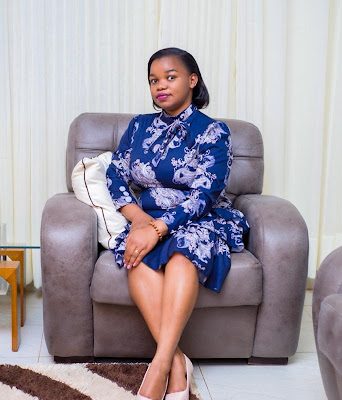
In 2019, Clarisse started MFURA Foundation, an initiative that focuses on gender based violence advocacy and prevention, girls and women empowerment. For young teens, early motherhood can complicate their lives. Most of teens conceive as a result of lack of proper sexual education, with fellow teens, some in search of basics needs, and in the worst cases, from rape from older adults in their communities like teachers, church leaders, etc. “The stories of teen mothers are full of struggles, tears, and hopelessness. This is what led me to start MFURA Foundation. After the unfortunate situation that happens to them and they get pregnant, some are rejected by their own families and their communities”, Clarisse said.
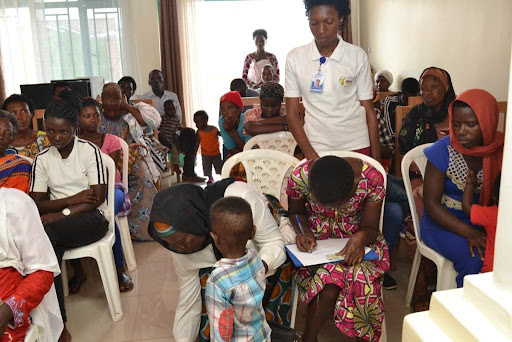
“In the beginning, MFURA Foundation started by raising awareness to the parents of the teen mothers, because we knew, though the initiative was designed to help the teen mothers, their families were still central to their lives.” When the teen mothers join the Foundation, they are at a vulnerable stage of their lives, stigmatized, with no hope for the future”. The initiative has a program tailored to help them through self discovery and build their confidence back. Through the different programs of the Foundation, they are taught different issues including gender based violence, and sexual reproductive health, nutrition and technical skills, like sewing by trained personnel,” Clarisse noted
When the COVID-19 pandemic hit, and a lot of things were put to a halt, young women, especially, teen mothers were the hardest hit. “Luckily at MFURA Foundation, the teen mothers could have some sort of support, even through the crisis, thanks to the support from both the local leadership, and other institutions”, Marie Clarisse said. I joined DOT Rwanda in December 2020 as one of the DOTYouth Street Team members. DOT Rwanda helped me a lot in terms of capacity building, program implementation process and funding. I was connected to a coach, to help design SMART goals, identify focus areas and how to monitor and evaluate the activities of the Foundation”, Clarisse added.
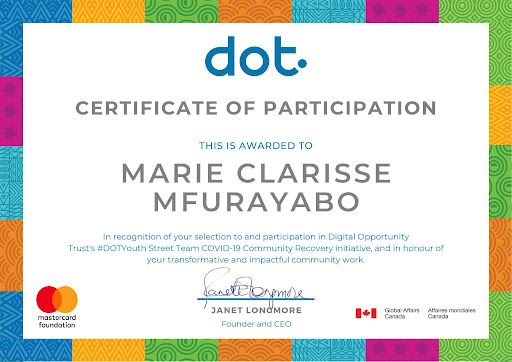
As a result of DOT’s peer-to peer approach, MFURA Foundation entered in a partnership with the Bright Future Contracting Company, founded by a fellow DOT Street member, to help the teen mothers to build 40 modernized kitchen gardens. This overall, facilitated the teen mothers in maternal, infant and child nutrition.
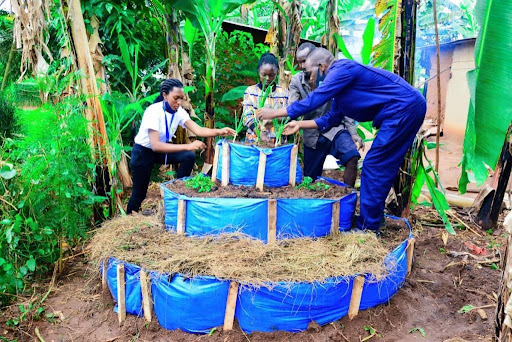
The team is helping teen mothers to build modernized kitchen gardens
Today, the MFURA Foundation has supported over 40 vulnerable teen mothers with counselling and empowering them to regain their confidence, Gender and Sexual Education, among others, as they reintegrate into the society. The mothers have also been equipped with skills through a Vocational Training Program in Tailoring, while complying with COVID-19 preventive measures.
From the start, the hardest part of the Mfura Foundation journey has been the finances. Through the pandemic, they had to reduce the capacity of their training center, having attendances five days a week instead of three, as before the pandemic. This means that they had to use more resources than expected. Instead of having the first cohort graduate in December 2020, they had the graduation ceremony in May 2021 ”, Clarisse highlighted.

MFURA Foundation presenting to the Mayor of Rwamagana district the teen mothers who have started a tailoring business after graduating from MFURA Foundation’s vocational training program
The graduates from the program have not only been equipped with the tailoring/sewing skills, but also sewing machines, and a three month rent payment to help them get started in their new profession. They will work as an association under MFURA Foundation for a period of 12months, for continuous training, and mentoring in financial management, among other things, to facilitate meaningful progress towards their socio-economic development.
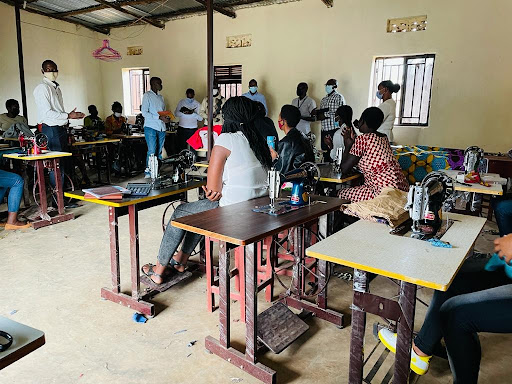
Clarisse looks forward to having MFURA Foundation continue to grow and scale to serve more teen mothers. To this end, the Foundation will seek to form strategic partnerships with different institutions, organizations, both local and international to strengthen the programs of the Foundation. These include UNICEF, UNFPA, GMO, NCDA , DOT Rwanda among others.
Read more inspiring stories
like Marie Clarisse Mfurayabo.